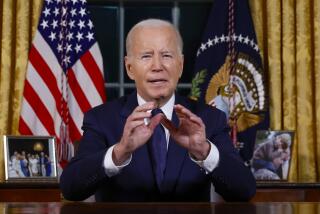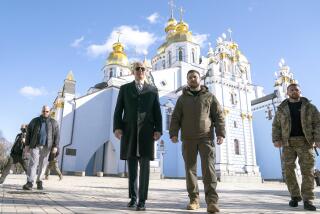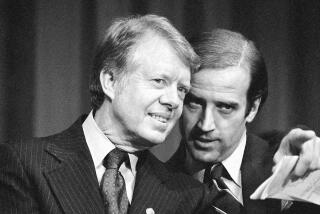BOSNIA / A Question of Stature : At Last, Political Leadership
- Share via
Sending American troops to Bosnia is the biggest political risk President Bill Clinton has ever taken.
Until now, Clinton has not paid a lot of attention to international policy. It was not the issue he ran on, or won on, in 1992.
He also knows two great political truths. Truth No. 1: Foreign policy cannot save you. Clinton learned that from President George Bush. In 1991, after his military triumph in the Persian Gulf, Bush stood astride the world like a colossus. In 1992, he was toast.
If he wants more evidence, Clinton might consider how much good the Camp David peace accords did President Jimmy Carter in 1980.
Truth No. 2: Foreign policy can destroy you. Clinton learned that lesson from Lyndon B. Johnson. The Vietnam War soured all Johnson’s domestic achievements--especially to young anti-war protesters like Clinton.
So why is Clinton taking the risk?
There’s a strong moral argument. Bosnia proves the great rule in world affairs: Unless the United States acts, nothing happens. We can stop the killing, Clinton feels. So we must act.
There’s also a strategic argument. It will confirm U.S. leadership of the Western alliance and, once again, rescue our feckless European allies from a problem they can’t resolve.
There’s a political argument, too. Clinton has always had a stature problem. He’s young, he’s untested and he has no military experience. A strong, successful performance in Bosnia could enhance his stature next to an older, tested veteran--like, say, Bob Dole.
Clinton believes that, one way or the other, he would have ended up sending troops to Bosnia during the 1996 campaign. Without a peace agreement, he would have had to send them on a dangerous mission to rescue U.N. peacekeeping forces.
So he decided to send troops on his own terms. And only after a peace agreement was in place. He reassured the nation Monday night, “America’s role will not be about fighting a war. It will be about helping the people of Bosnia to secure their own peace.”
Clinton is being careful about Bosnia. What about the military risks? And the command U.S. forces will serve under? He thought of that. “The risks to our troops will be minimized,” he told the country. “American troops will take their orders from the American general who commands NATO.”
Will the Americans be sitting ducks, as they were in Lebanon? He thought of that, too. “We will fight fire with fire--and then some.”
And what about consulting Congress? Will do. “If the NATO plan meets with my approval, I will immediately send it to Congress and request its support.”
Clinton’s opponents may criticize what he’s doing in Bosnia. But they have to admit he’s doing it the right way. “While I disagree with the President, and while I don’t believe he has the authority without specific congressional approval to put an American army into Bosnia, he is leading,” GOP presidential contender Patrick J. Buchanan said last week. “The President is taking a stand.”
Clinton has his critics boxed in. They can’t defeat his policy without undermining a U.S. commitment. As Sen. John McCain (R-Ariz.) said, “The credibility of the word of the United States President is of enormous strategic value to the American people and essential to our security.”
Remember all the criticism Clinton has gotten about letting his policies be determined by public opinion? Well, he’s not exactly following the polls on Bosnia. In one poll taken immediately after the President’s speech, the public continued to oppose sending U.S. troops to Bosnia, 58% to 33%.
On Thursday, Clinton scored a key political victory when Senate majority leader and GOP front-runner Bob Dole (R-Kan.) said he would support the Bosnian mission--reluctantly. “We have one President at a time.” Dole said. “He is the commander in chief. He’s made his decision. I don’t agree with it. I think it’s a mistake. We had a better option. But now it’s high noon, the troops are on the way and they’re looking to us for support.”
Dole acted in order to preserve what he regards as the valuable tradition of bipartisanship in foreign policy--a tradition he has an interest in preserving.
Remember all the criticism Dole has gotten about pandering to the right? Well, he’s not exactly pandering now.
The fact is, Bosnia splits the GOP. Sen. Phil Gramm (R-Tex.), one of Dole’s leading rivals, is against him on the issue. But McCain, a Gramm supporter, is with Dole. And one of Dole’s leading supporters, Sen. Alfonse M. D’Amato (R-N.Y.), said of Clinton’s policy, “It is unnecessary, it is wrong and I will oppose it with every fiber in my body.”
Dole’s decision plays right into the hands of Buchanan. Buchanan wrote a letter to Dole last week, in which he said, “Bob, don’t go along with this. This time, lead. This time, rally the Congress to stand up and say, ‘No,’ to a President who would put the best and bravest of America’s young men into a Balkan quagmire where America, and Americans, don’t belong.”
So what if Dole makes Buchanan mad? Dole would love to see Buchanan become his main competitor for the GOP nomination. Dole knows the GOP is never going to nominate Buchanan, an isolationist and a protectionist, for President. It would be like Jesse Jackson running against Michael S. Dukakis in 1988. Democrats may have had doubts about Dukakis, but they were never going to nominate Jackson.
For years now, Dole has made Bosnia his special cause. If Clinton’s policy in Bosnia fails, Dole can argue he would have done it the right way.
What if Clinton’s policy in Bosnia succeeds? Dole may remember that, in 1991, when a majority of Democrats in Congress opposed the Persian Gulf War, Arkansas Gov. Clinton supported it. And it didn’t do Clinton a bit of harm.
Congress will almost certainly support the mission, but only after members feel they have issued sufficient warnings and reservations to give themselves political cover. If Bosnia goes wrong, members of Congress want to be able to point to speeches they gave and say, “We told you so.”
The GOP congressional majority is in the same position the then-majority Democrats were in during the Gulf War debate. They don’t want to be seen as an isolationist party that refuses to project U.S. leadership in the world. And they want to preserve the credibility of the President as an institution and of the United States as a nation. As McCain put it, “Our friends and enemies don’t discriminate between a Democrat and a Republican President when the word of an American President is given.”
In the end, however, Congress is a bystander on issues like this. This is the President’s move. If it works, it may raise his stature a bit. But it won’t save him if he’s in trouble on other issues the way Carter and Bush were.
If it fails--if the peace agreement falls apart and Americans start getting killed--it will destroy him. His lack of military credibility will become a terrible burden as he runs for reelection.
Clinton and Dole both made bold moves this week, and both took big political risks. The President is trying to lead a nervous and skeptical country in a direction he believes is right. The senator is trying to lead a nervous and skeptical party to uphold the principle of bipartisanship in world affairs.
That’s called leadership, and it doesn’t happen so often these days that we should fail to notice.*
More to Read
Sign up for Essential California
The most important California stories and recommendations in your inbox every morning.
You may occasionally receive promotional content from the Los Angeles Times.













